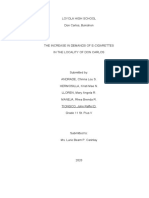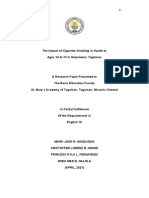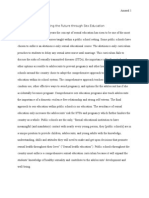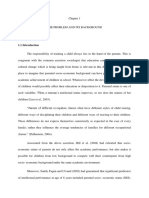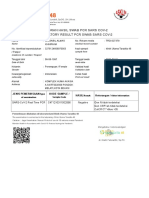Chapter 5 - Alcohol
Chapter 5 - Alcohol
Uploaded by
Lei LacernaCopyright:
Available Formats
Chapter 5 - Alcohol
Chapter 5 - Alcohol
Uploaded by
Lei LacernaOriginal Description:
Original Title
Copyright
Available Formats
Share this document
Did you find this document useful?
Is this content inappropriate?
Report this DocumentCopyright:
Available Formats
Chapter 5 - Alcohol
Chapter 5 - Alcohol
Uploaded by
Lei LacernaCopyright:
Available Formats
THE IMPACT OF ALCOHOLIC BEVERAGES ON THE ACADEMIC PERFORMANCE OF SELECTED ABM STUDENTS IN OUR LADY OF FATIMA
UNIVERSITY-Q.C ON YEAR 2019
CHAPTER 5
DISCUSSION
CONCLUSION:
1. Majority of the respondents are below the legal drinking age. The researchers conclude that
many youth of this generation has already been active of drinking alcohol as early as these
age ranges.
2. Majority of the respondents have a high academic performance rate. Only a few of the
respondents got 80 and below. This just proves that Our Lady of Fatima University-Quezon
city campus has effective teaching system.
3. Many Filipino youth tend to enjoy drinking our very own brand of alcoholic beverages
based on the result of our survey. According to it, 45% prefers our own brand. 25% prefers
international alcoholic drinks, while 30% prefers both local and international alcoholic
brands.
4. Based on our survey, youth drinkers tend to be mostly moderate drinkers for the
respondents want to stay responsible and considerate of the consequences of drinking
alcohol at the same time, while still having fun.
5. Students with the highest academic performance that are light and moderate drinkers tend
to prefer international brand of alcoholic beverages for its quality: may it be on its taste,
quantity, packaging and/or percentage of alcohol. On the other hand, some respondents,
especially moderate and heavy drinkers of local alcoholic brands has the lowest average in
academic performance. This is because they most likely not care at all about the quantity
of alcohol that they intake that causes negative effect on their studies. Nevertheless, there
is only just a slight difference between the two.
6. Therefore, the researchers conclude that there is only a slight correlation between their
academic performances to what type of drinker they are. This only shows that students,
ranging from 16-20 years of age can balance well their social life and their academic life.
We were able to tell this based on the result of this study. Whatever type of drinker you
are, or which alcohol brand you prefer, it does not affect the student’s academic
OUR LADY OF FATIMA UNIVERSITY-Q.C SENIOR HIGH SCHOOL
THE IMPACT OF ALCOHOLIC BEVERAGES ON THE ACADEMIC PERFORMANCE OF SELECTED ABM STUDENTS IN OUR LADY OF FATIMA
UNIVERSITY-Q.C ON YEAR 2019
performance unless they want it to. Everyone is their own person and we choose how we
act as well as handle certain situations. It is on us as an individual if we want to let things
such as alcohol negatively affect our life or not.
RECOMMENDATIONS:
1. We recommend the future researchers to add more respondents to this study so that
results would be more accurate and broad.
2. The future researchers should provide themselves more time if ever they would re-
study this research, especially on the data gathering part so that they could ask their
respondents to provide a photocopy of their Grade 11 report card to provide more
accuracy on giving their General Weighted Average.
3. The future researchers should also make a campaign that will make the adults here in
our country more open about youth alcohol consumption. That the adults, especially
the relatives and academe leaders of the students would be more open and
understanding with the alcohol consumption of the youth.
OUR LADY OF FATIMA UNIVERSITY-Q.C SENIOR HIGH SCHOOL
THE IMPACT OF ALCOHOLIC BEVERAGES ON THE ACADEMIC PERFORMANCE OF SELECTED ABM STUDENTS IN OUR LADY OF FATIMA
UNIVERSITY-Q.C ON YEAR 2019
References:
Balsa et al. (2008). “The effects of alcohol use on academic achievement in high school”.
https://www.ncbi.nlm.nih.gov/pmc/articles/PMC3026599/#!po=0.490196
Butler G. July 4, (2006). “The Grim Neurology of Teenage Drinking”.
https://www.nytimes.com/2006/07/04/health/04teen.html
Finn et al. (2006). “Alcohol expectancies, conduct disorder and early-onset alcoholism: negative
alcohol expectancies are associated with less drinking in non-impulsive versus impulsive
subjects”. https://www.ncbi.nlm.nih.gov/pmc/articles/PMC1490023/.
Mallett et al. (2010). “Examining the Unique Influence of Interpersonal and Intrapersonal Drinking
Perceptions on Alcohol Consumption Among College Students”.
https://www.ncbi.nlm.nih.gov/pmc/articles/PMC2653604/
Swahn A. (2013). “Alcohol Exposures, Alcohol Marketing, and Their Associations with Problem
Drinking and Drunkenness among Youth Living in the Slums of Kampala, Uganda”.
https://www.hindawi.com/journals/isrn/2013/948675/.
Swahn & Palmier. (2013). “Alcohol abuse causes 3.2% of all deaths worldwide annually and also
accounts for 4.0% of the global disease burden each year.”
https://www.nytimes.com/2006/07/04/health/04teen.html
Timpf. (2015). “Drinking Can Affect Academic Success”.
https://www.ourthinkingaboutdrinking.com/opinions/alcohol-academics-drinking-can-affect-
academic-success/
Tacio R. (2018). “Drinking is hazardous to youth’s health”.
https://businessmirror.com.ph/2018/02/15/drinking-is-hazardous-to-youths-health/
OUR LADY OF FATIMA UNIVERSITY-Q.C SENIOR HIGH SCHOOL
THE IMPACT OF ALCOHOLIC BEVERAGES ON THE ACADEMIC PERFORMANCE OF SELECTED ABM STUDENTS IN OUR LADY OF FATIMA
UNIVERSITY-Q.C ON YEAR 2019
Van der Vorst H, et al. Psychol Addict Behav. (2008). “Parental attachment, parental control, and
early development of alcohol use: a longitudinal study”.
https://www.ncbi.nlm.nih.gov/m/pubmed/16784352/
White, Ph.D. & Hingson, Sc.D. (2010). “The Burden of Alcohol Use: Excessive Alcohol
Consumption and Related Consequences Among College Students”.
https://pubs.niaaa.nih.gov/publications/arcr352/201-218.htm.
OUR LADY OF FATIMA UNIVERSITY-Q.C SENIOR HIGH SCHOOL
You might also like
- Congestive Heart Failure NCPDocument6 pagesCongestive Heart Failure NCPShaira Ann Calamba100% (1)
- Research IIDocument39 pagesResearch IIKevin GuerreroNo ratings yet
- Teenage Pregnancy Chapter 1Document2 pagesTeenage Pregnancy Chapter 1KRIZZEL CATAMINNo ratings yet
- The Effects of Alcohol Use On The Academic Achievements of Selected Senior High School Student at Coliling National High SchoolDocument16 pagesThe Effects of Alcohol Use On The Academic Achievements of Selected Senior High School Student at Coliling National High SchoolElizabeth GatpoNo ratings yet
- Final - Research Paper (Lourie Joy)Document36 pagesFinal - Research Paper (Lourie Joy)Mary May BalagbisNo ratings yet
- Assessment of Underage Drinking in The PhilippinesDocument14 pagesAssessment of Underage Drinking in The PhilippinesLeo Buluran0% (1)
- Research Paper Jiechel Group June 21, 2021Document38 pagesResearch Paper Jiechel Group June 21, 2021dolly kate cagadas100% (1)
- Thesis Pr1 IijimaDocument16 pagesThesis Pr1 IijimaAnonymous yUUVGwwOtNo ratings yet
- Effects Nof Students' Alcoholism On Their Academic Performance in Jose Rizal Memotial State University, Dipolog CampusDocument5 pagesEffects Nof Students' Alcoholism On Their Academic Performance in Jose Rizal Memotial State University, Dipolog CampusbengNo ratings yet
- Teenage Social Relationships Towards Alcohol Affecting Health and Education of StudentsDocument47 pagesTeenage Social Relationships Towards Alcohol Affecting Health and Education of StudentsChristine Ramirez80% (5)
- The Effects of Alcohol Use On Academic Performance Among CollegeDocument12 pagesThe Effects of Alcohol Use On Academic Performance Among CollegeKai AkariNo ratings yet
- Student Attitudes Towards Drinking BehaviorsDocument27 pagesStudent Attitudes Towards Drinking BehaviorsGlaiza Mae Tecson Villacastin100% (1)
- Causes of Drinking Alcohol Perception of SHS StudentsDocument26 pagesCauses of Drinking Alcohol Perception of SHS StudentsAngela E. AlinsunurinNo ratings yet
- ABM Chapter 2 Group 7 Research Part 1Document11 pagesABM Chapter 2 Group 7 Research Part 1Micah PabillarNo ratings yet
- Extent of Alcohol Intake Among Senior High School StudentsDocument4 pagesExtent of Alcohol Intake Among Senior High School Studentsanabel abalosNo ratings yet
- DocumentDocument8 pagesDocumentKyla Marie de LunaNo ratings yet
- Research Chapter 1 3Document21 pagesResearch Chapter 1 3anon_53520000100% (1)
- THE IMPACTS OF USING ALCOHOL AND CIGARETTES CONSUMPTION IN ACADEMIC PERFORMANCE OF THE HIGH SCHOOL STUDENTS IN Group 1 AristotleDocument15 pagesTHE IMPACTS OF USING ALCOHOL AND CIGARETTES CONSUMPTION IN ACADEMIC PERFORMANCE OF THE HIGH SCHOOL STUDENTS IN Group 1 AristotleEerised TablacNo ratings yet
- Research Paper About AlcoholDocument5 pagesResearch Paper About Alcoholjeffrey moralesNo ratings yet
- Walwal Now, Aral Later: The Effect of Alcohol Consumption To Mechanical Engineering Students' Academic PerformanceDocument18 pagesWalwal Now, Aral Later: The Effect of Alcohol Consumption To Mechanical Engineering Students' Academic Performancetoni50% (2)
- Chapter 1-3Document28 pagesChapter 1-3Exekiel Albert Yee Tulio50% (2)
- Perceptions of Grade 12 Students in Drinking AlcoholDocument54 pagesPerceptions of Grade 12 Students in Drinking AlcoholNestor Gerotape DiosanaNo ratings yet
- Alcoholism PDFDocument99 pagesAlcoholism PDFJUNELLA CARNAJENo ratings yet
- A Qualitative Study of Smoking Behaviors Among Teenager in PhilippinesDocument24 pagesA Qualitative Study of Smoking Behaviors Among Teenager in PhilippinesJohn Felix LontokNo ratings yet
- Drinking Alcohol ResearchDocument16 pagesDrinking Alcohol ResearchNorieliza Lazola GonzagaNo ratings yet
- PR1Document22 pagesPR1Mylene HeragaNo ratings yet
- THE EFFECTS OF ALCOHOL TO 1st YEAR EDUCATION STUDENTS OF LICEO DE CAGAYAN UNIVERSITYDocument19 pagesTHE EFFECTS OF ALCOHOL TO 1st YEAR EDUCATION STUDENTS OF LICEO DE CAGAYAN UNIVERSITYJiji Benasing100% (1)
- PR2 1-3Document13 pagesPR2 1-3Kara Kyrel Dela CruzNo ratings yet
- Thesis Chapter 1 5Document14 pagesThesis Chapter 1 5Felicity Mae Dayon BaguioNo ratings yet
- The Impacts of Alcohol Consumption To The Academic Performance of SHS Students: A Case StudyDocument9 pagesThe Impacts of Alcohol Consumption To The Academic Performance of SHS Students: A Case StudyKlowie DuiganNo ratings yet
- The Effect of Smoking Ages Between 13-17Document67 pagesThe Effect of Smoking Ages Between 13-17Kristoffer Indino100% (1)
- RESEARCHDocument12 pagesRESEARCHCHAPLAIN JEAN ESLAVA100% (1)
- ChapterDocument12 pagesChapterRegine Navarro RicafrenteNo ratings yet
- Statement of The ProblemDocument1 pageStatement of The ProblemRegine Navarro Ricafrente100% (1)
- Factors That Affect The Generation Z in Drinking Alcohol As Basis For Self - Growth and Development at Southville, Marinig S. Y. 2019 - 2020Document118 pagesFactors That Affect The Generation Z in Drinking Alcohol As Basis For Self - Growth and Development at Southville, Marinig S. Y. 2019 - 2020Cristine Mae BelgeraNo ratings yet
- Questionnaire Prac. ResDocument1 pageQuestionnaire Prac. ResNestor Gerotape DiosanaNo ratings yet
- Research Alcoholism 1Document6 pagesResearch Alcoholism 1Bless CotingjoNo ratings yet
- Review Related LiteratureDocument7 pagesReview Related Literaturehannah enopiaNo ratings yet
- CHAPTER 4-AlcoholDocument16 pagesCHAPTER 4-AlcoholLorie Anne ValleNo ratings yet
- ThesisDocument16 pagesThesisMhOt AmAdNo ratings yet
- Smoking Among Juveniles: A StudyDocument40 pagesSmoking Among Juveniles: A StudySamTimalsina0% (1)
- Perceptions and Health Effects of Electronic Cigarettes Among ColDocument48 pagesPerceptions and Health Effects of Electronic Cigarettes Among Colabigail raccaNo ratings yet
- Chapter 1 5 Drugs RecomputedDocument66 pagesChapter 1 5 Drugs RecomputedDick Jefferson Ocampo PatingNo ratings yet
- Chapter 2 RDocument23 pagesChapter 2 RJasper R. CastroverdeNo ratings yet
- The Effects of Alcohol On Juvenile Delinquency To The Study O1Document8 pagesThe Effects of Alcohol On Juvenile Delinquency To The Study O1althea caballero100% (1)
- HABIT OF USING VAPE CIGARETTE - docxNEWDocument21 pagesHABIT OF USING VAPE CIGARETTE - docxNEWJustinemae UbayNo ratings yet
- Persuasive EssayDocument6 pagesPersuasive Essaychamaral1No ratings yet
- Effects of Alcohol Drinking in The Physical and Mental Health of The Selected Students of Grade-12 of Polillo National High School-Senior HighDocument15 pagesEffects of Alcohol Drinking in The Physical and Mental Health of The Selected Students of Grade-12 of Polillo National High School-Senior HighElaine Key MarasiganNo ratings yet
- Factors of Alcohol Consumption ThesisDocument34 pagesFactors of Alcohol Consumption ThesisLowie Jay Mier Orillo100% (1)
- Chapter 1 5Document36 pagesChapter 1 5LucyNo ratings yet
- Chapter 1-3Document18 pagesChapter 1-3John Lloyd MarasiganNo ratings yet
- Ffects of Pornography Addiction On Grade 11 StudentsDocument60 pagesFfects of Pornography Addiction On Grade 11 StudentsRia TabuacNo ratings yet
- University of Perpetual Help System Dalta: Effects of Teenage Pregnancy On The Academic Performance of StudentsDocument4 pagesUniversity of Perpetual Help System Dalta: Effects of Teenage Pregnancy On The Academic Performance of StudentsKyle Castil100% (1)
- GRADE 12 HUMSS J GROUP 1 RESEARCH 2021 20221J2J3 FINAL Converted 1Document16 pagesGRADE 12 HUMSS J GROUP 1 RESEARCH 2021 20221J2J3 FINAL Converted 1Ronald Angelo AgbayaniNo ratings yet
- Alcohol Use Among Senior High School Stubents in The Ga Central Municipality - July 2016 PDFDocument75 pagesAlcohol Use Among Senior High School Stubents in The Ga Central Municipality - July 2016 PDFKobe Oddin0% (1)
- ResearchDocument12 pagesResearchEvaNo ratings yet
- Chapter 1Document6 pagesChapter 1Maria MacelNo ratings yet
- The Effects of Bullying in Academic Performance of Cookery and SMAW Students in The PCISTDocument2 pagesThe Effects of Bullying in Academic Performance of Cookery and SMAW Students in The PCISTjohaira caparida100% (1)
- Research - Chapter 1 (1. Villaruel, Aldwin D.)Document7 pagesResearch - Chapter 1 (1. Villaruel, Aldwin D.)shanNo ratings yet
- Research Methods - Final PaperDocument9 pagesResearch Methods - Final Paperapi-623352013No ratings yet
- Michelles Presentation PR2Document29 pagesMichelles Presentation PR2Monica JoyceNo ratings yet
- Grade 6 Joy in Learning EnglishDocument2 pagesGrade 6 Joy in Learning Englishjude100% (1)
- 4.ISCA IRJMedS 2016 024Document7 pages4.ISCA IRJMedS 2016 024danielwikwatyo701No ratings yet
- ThalassemiaDocument24 pagesThalassemiaanimesh panda100% (1)
- Lower Extremity AmputationsDocument42 pagesLower Extremity Amputationsalinutza_childNo ratings yet
- Unit 1Document52 pagesUnit 1TRAN THI KIM NGANNo ratings yet
- Evidence Based Practice in MidwiferyDocument40 pagesEvidence Based Practice in MidwiferyManinder SekhonNo ratings yet
- Laporan Hasil Swab PCR Sars Cov-2 Laboratory Result PCR Swab Sars Cov-2Document1 pageLaporan Hasil Swab PCR Sars Cov-2 Laboratory Result PCR Swab Sars Cov-2SalsaNo ratings yet
- Ich Guidelines IndexDocument5 pagesIch Guidelines IndexKrishnaraj DhavalaNo ratings yet
- Multiple Myloma AneamiaDocument3 pagesMultiple Myloma AneamiaShafiq Ahmad KhanNo ratings yet
- Health EducationDocument26 pagesHealth EducationALYSSA NICOLE GINESNo ratings yet
- Lesson Plan ON Regulatory Bodies AND Professional OrganizationDocument7 pagesLesson Plan ON Regulatory Bodies AND Professional OrganizationDebashrita Misra100% (1)
- Health 10 Learning MaterialDocument34 pagesHealth 10 Learning MaterialElaine Mae Guillermo Esposo43% (23)
- Epidemiological Study MethodsDocument38 pagesEpidemiological Study MethodsPrem Deep100% (1)
- Patient Details History Discussion and MDT PlanDocument2 pagesPatient Details History Discussion and MDT PlanRogers ByebwaNo ratings yet
- Types of ICU MedicationsDocument7 pagesTypes of ICU Medications8666r69rksNo ratings yet
- Perceived Stress, Well-Being, and Coping Strategies of Grade 12 Students in A Catholic Private Senior High School Amidst The COVID-19 PandemicDocument10 pagesPerceived Stress, Well-Being, and Coping Strategies of Grade 12 Students in A Catholic Private Senior High School Amidst The COVID-19 PandemicPsychology and Education: A Multidisciplinary JournalNo ratings yet
- Material Safety Data Sheet BXL-2: 1. Chemical Product and Company IdentificationDocument5 pagesMaterial Safety Data Sheet BXL-2: 1. Chemical Product and Company IdentificationbayuNo ratings yet
- 1 s2.0 S016517811932267X AmDocument31 pages1 s2.0 S016517811932267X AmNurul Khadijah KamalNo ratings yet
- Occupational Safety and Health Administration code:18CVENOESADocument17 pagesOccupational Safety and Health Administration code:18CVENOESAAishwarya NaiduNo ratings yet
- DementiaDocument40 pagesDementiacvmqx7yppdNo ratings yet
- NCM 108 Bioethics Finals 1Document10 pagesNCM 108 Bioethics Finals 1Martina MedranoNo ratings yet
- PEP20 02 01 004 - Final - 508Document346 pagesPEP20 02 01 004 - Final - 508Amel Ez100% (1)
- 8 Foods That Beat A MultivitaminDocument9 pages8 Foods That Beat A MultivitaminCau GomesNo ratings yet
- Colorful Pattern Indian Handicrafts BrochureDocument2 pagesColorful Pattern Indian Handicrafts BrochureIrish S. DelacruzNo ratings yet
- 4human Body - Assignment 3 - Bowel EliminationDocument6 pages4human Body - Assignment 3 - Bowel EliminationLanfrancNo ratings yet
- Fall 1 Professional Development PlanDocument9 pagesFall 1 Professional Development Planapi-681176565No ratings yet
- MSDS - Bonded Abrasives Stainless Steel EN - Rev 2 - TailinDocument6 pagesMSDS - Bonded Abrasives Stainless Steel EN - Rev 2 - TailinPedro leon muñozNo ratings yet
- Medical Power of Attorney Designation of Health Care AgentDocument4 pagesMedical Power of Attorney Designation of Health Care AgentThe Real BluesdaddyNo ratings yet
- Medkad Digital Company Profile 2023Document22 pagesMedkad Digital Company Profile 2023kpdovedentNo ratings yet

























